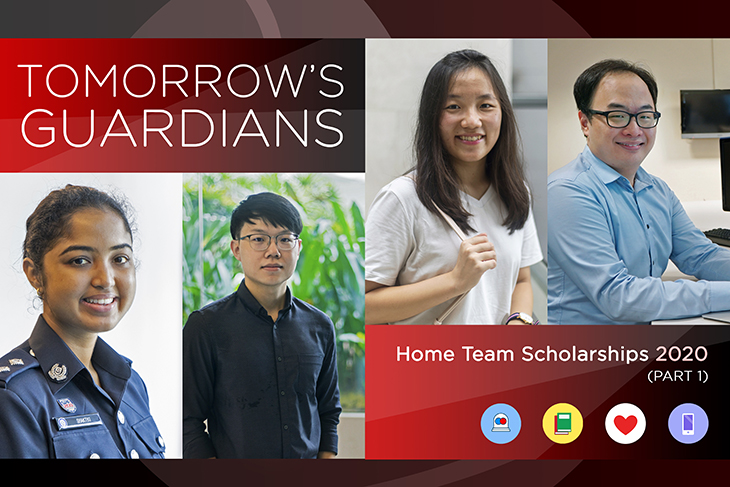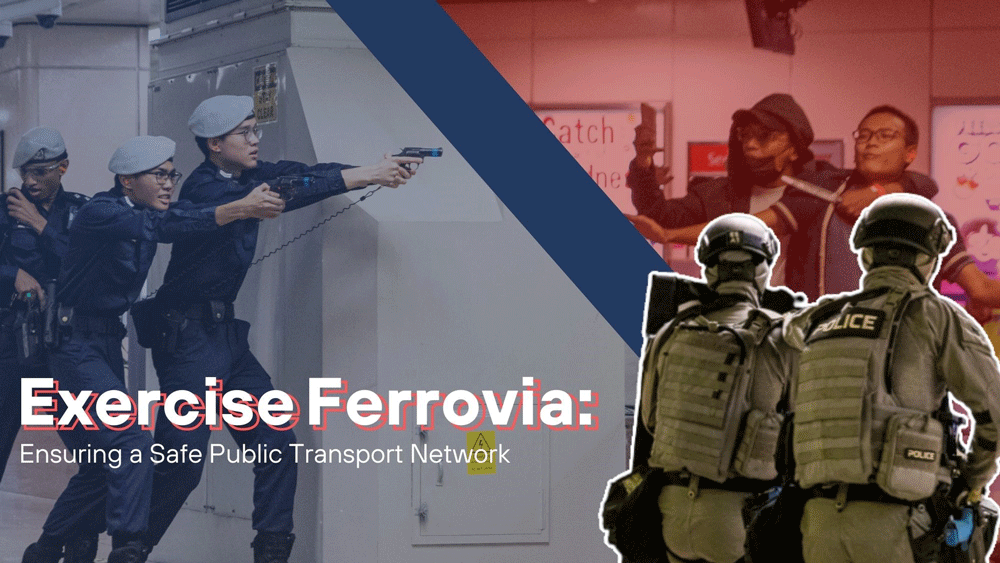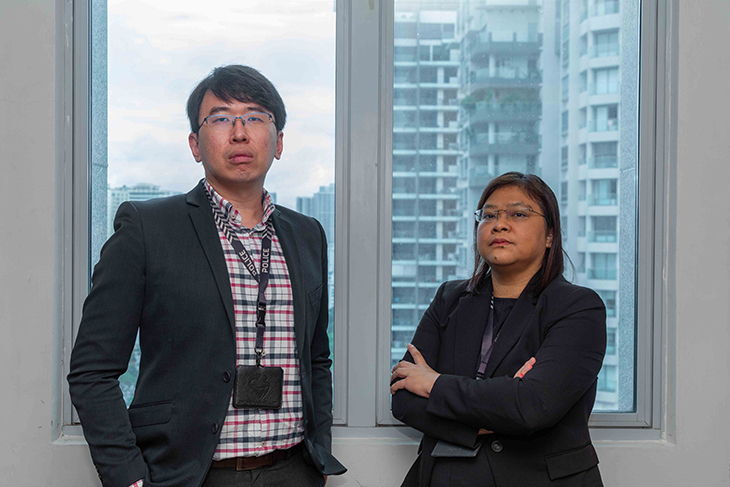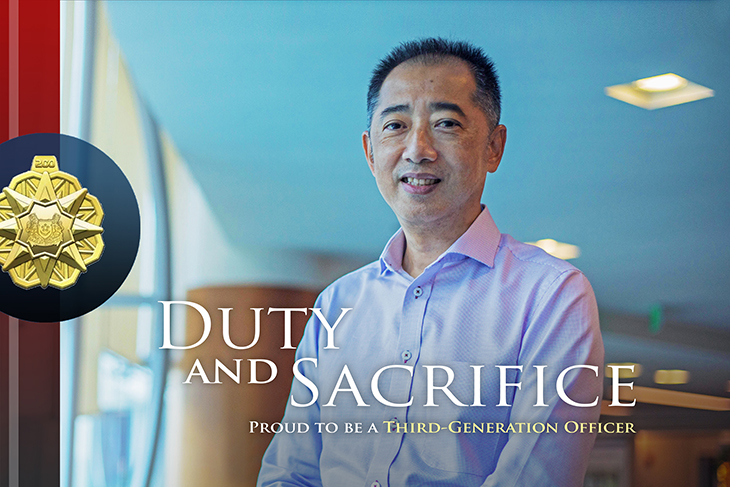 It’s all about the mission – after a delay due to the COVID-19 outbreak, 924 Home Team officers received honours at the Ministry of Home Affairs (MHA) National Day Awards Investiture 2021 for their outstanding performance and dedication to keeping Singapore safe and secure. We speak to three award recipients about their mission-centric focus.
It’s all about the mission – after a delay due to the COVID-19 outbreak, 924 Home Team officers received honours at the Ministry of Home Affairs (MHA) National Day Awards Investiture 2021 for their outstanding performance and dedication to keeping Singapore safe and secure. We speak to three award recipients about their mission-centric focus.
SKIPPER OF MANY SHIPS
Shee Gim Leng
Deputy Director, Training and Learning Systems, Policing Programme Management Centre (PPMC), Home Team Science and Technology Agency (HTX); recipient of the Public Administration Medal (Bronze)
 Tell us about what you do daily at HTX.
Tell us about what you do daily at HTX.
PPMC’s role is to support the
Singapore Police Force in its technological advancement and capability development. In my work, there are stakeholders to engage, project developmental issues to manage and “live” system problems to solve almost every single day. The tempo of work is high as we move towards a “digital-to-the-core” approach. It’s like being the skipper of not just one ship, but many, leading our crews to stay on course and push forward in rough seas.
What are some challenges you face as an engineer, and how do you overcome them?
One challenge is that demand can outstrip our engineering resources. Hence, we’re now identifying common operational needs and capabilities across the Home Team to aggregate demand and to then build platforms that cater to each Home Team Department’s needs. This will allow us to offer effective technological solutions and while reaping economies of scale.
An example of this is the common medical IT platform for MHA and the Singapore Prison Service. These were initially separate projects that we developed into a single enterprise system, which now allows multiple Home Team Departments to optimise resources.
 What do you love about your work at HTX?
What do you love about your work at HTX?
It gives me many opportunities to find meaning in service, and also to create value for fellow officers and our organisation as a whole.
Share a mission-centric moment from your career that you’re proud of.
When the COVID-19 outbreak began in 2020, I led a HTX team to develop an interim lab information system for PCR testing at our checkpoints. Everyone in the team worked round the clock to get the whole system operational within two months. It was a remarkable achievement considering the constraints we faced!
NEVER AN EASY PROCESS
Kwek Boon Siang
Senior Assistant Director, Psychological Services Branch, Singapore Prison Service (SPS); recipient of the Commendation Medal
 What prompted you to join SPS?
What prompted you to join SPS?
I was attracted by SPS’ mission and purpose. I strongly believe that every inmate and ex-offender has the potential to change and make a positive difference in the lives of others.
Tell us about your daily work at SPS.
I help to oversee a team of psychologists who conduct effective, evidence-informed psychological risk assessments and interventions for inmates. On a daily basis, I’m either in a meeting room or a counselling room – to discuss policies, plan strategies and work on innovation-related projects; or to conduct assessments and interventions. At times, I also lead training sessions for Prison officers and our community partners, and conduct research on topics related to sexual or violent offending behaviours.
What are some challenges you face in your work, and how do you deal with them?
Changing human behaviour is never an easy process, more so for inmates and ex-offenders, who tend to face greater difficulties than many of us. COVID-19 has only amplified the challenges, in how we can support them in their rehabilitation journey.
That’s why I’m grateful for the technological infrastructure that has been put in place by the Home Team and SPS, which has facilitated virtual psychological intervention sessions with inmates and ex-offenders, especially when we weren’t able to conduct physical sessions.
 What do you love about your work?
What do you love about your work?
Growth and meaning! The variety of training and work opportunities offered by the Home Team and SPS have helped me to grow professionally and personally. I also find my work to be very meaningful! Be it policy-related work or counselling, I know I’m playing my small part to impact lives and keep Singapore safe and secure.
How do you feel about receiving the Commendation Medal this year?
I feel grateful to receive it. It’s a recognition of all the good work of my predecessors and team-mates. I dedicate the Medal to them as well!
SERVING THE CAUSE
Freddy Low
Deputy Director, Skills@YR, Yellow Ribbon Singapore (YRSG); recipient of the Commendation Medal
 Tell us about yourself and what you do on a daily basis.
Tell us about yourself and what you do on a daily basis.
I’ve served in the Home Team for slightly more than 10 years. My day-to-day scope includes managing two dedicated teams who facilitate relevant skills training for inmates and ex-offenders, and working with private enterprises to offer work programme opportunities to inmates in prison.
What's one thing people don't know about employment opportunities for inmates and ex-offenders?
Some of us may think that inmates and ex-offenders are likely to consider or take up any job that’s available to them. This is not the case. The beneficiaries we serve, despite their mistakes, have minds of their own and have varied career aspirations. We need to recognise that, and encourage them to pursue their dreams.
Share with us a memorable experience from your decade of service.
Several years ago, a youth ex-offender walked into my office looking for a job in either engineering or oil & gas. Given his tender age and his lack of work experience, I sat him down and had a good conversation with him regarding skills and jobs. Eventually, I guided him into considering a NITEC programme and applying for a
Yellow Ribbon Fund Star Bursary. He was given the Bursary and went on to score good grades, eventually qualifying for a Higher NITEC Programme. He’s now working in the oil & gas industry and is also a Yellow Ribbon Volunteer at our events.
What do you love about your job at YRSG?
It’s very meaningful to be able to do good as an occupation. By helping to equip inmates and ex-offenders with relevant skills, we can improve their employability and facilitate subsequent career growth. This allows them to contribute to society and remain crime-free, with the support of a compassionate and inclusive community.
How do you feel about receiving the Commendation Medal?
I credit the stakeholders I work with in my course of work. Successful reintegration outcomes and lower recidivism rates are the result of a collective effort from the Home Team, other government agencies, the private sector and members of the public.
Read
All About the Mission (Part 1)












